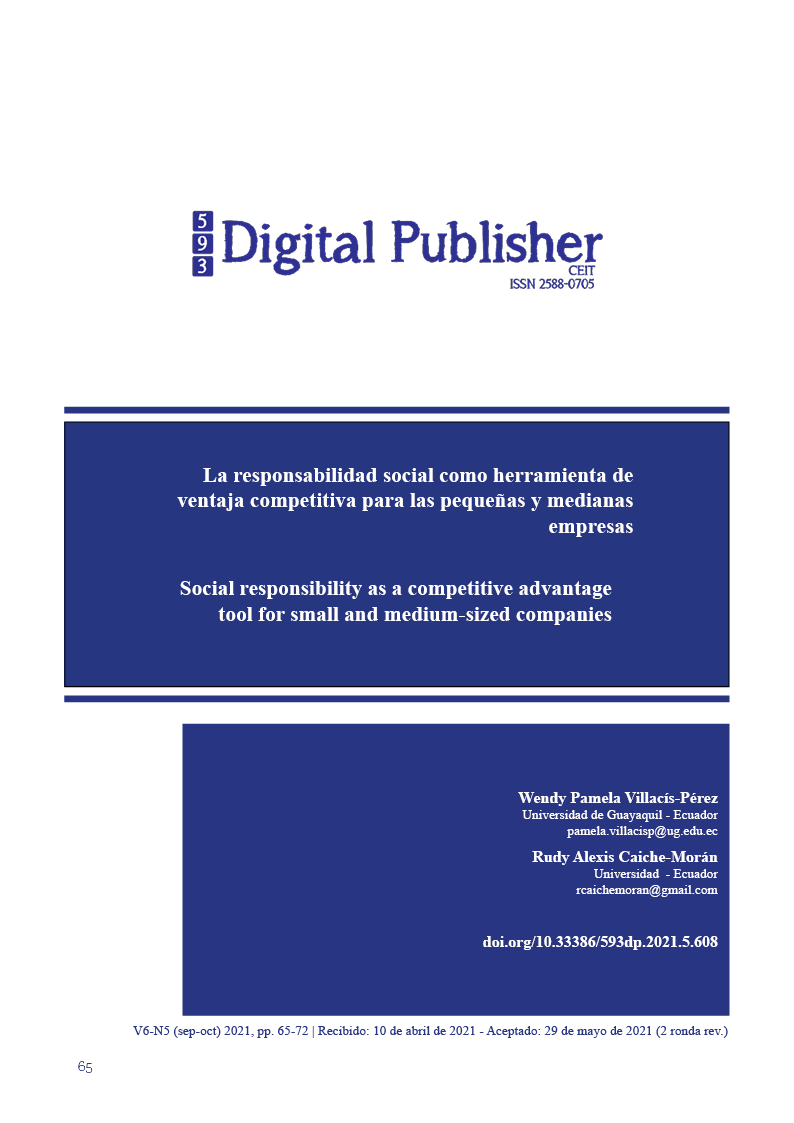Social responsibility as a competitive advantage tool for small and medium-sized companies
Main Article Content
Abstract
The following research aims to identify the key definitions of this with a critical approach, reviewing the advantages and disadvantages of the type of business management.
When implementing and designing strategies, companies must consider the external effects on the social aspects involved in their activity.
Then, to explain the competitive advantage that Corporate Social Responsibility represents, it is determined as a form of management that leads to the redistribution of the surplus of the small and medium-sized company, in how to make better allocations of its resources, leading to greater acceptance and with it to a better positioning.
Corporate Social Responsibility (CSR) is a new vision of strategic management and corporate ethics of organizations, where technological, economic and cultural change have ended up redefining the relationship they have with their audiences and with the environment. Considering small and medium-sized companies (SMEs) as a transcendental element in the economy and social composition, this work reviews and analyzes the role that CSR can play in the management of its intangibles and in the production of value within this type of business format.
Downloads
Article Details

This work is licensed under a Creative Commons Attribution-NonCommercial-ShareAlike 4.0 International License.
1. Derechos de autor
Las obras que se publican en 593 Digital Publisher CEIT están sujetas a los siguientes términos:
1.1. 593 Digital Publisher CEIT, conserva los derechos patrimoniales (copyright) de las obras publicadas, favorece y permite la reutilización de las mismas bajo la licencia Licencia Creative Commons 4.0 de Reconocimiento-NoComercial-CompartirIgual 4.0, por lo cual se pueden copiar, usar, difundir, transmitir y exponer públicamente, siempre que:
1.1.a. Se cite la autoría y fuente original de su publicación (revista, editorial, URL).
1.1.b. No se usen para fines comerciales u onerosos.
1.1.c. Se mencione la existencia y especificaciones de esta licencia de uso.
References
Antonio Vives y Estrella Peinado. (2006). La RSC y el sistema de mercado. Compromiso Empresarial.
Churchill L. (2012). The Teaching of Ethics and Moral Values. Journal of Higher.
Collins D.y Montgomery C. . (2005). Competing on Resources, Harvard Business.
El mercantil valenciano. (2015). Responsabilidad Social más que una estrategia de Marketing. Obtenido de https://www.levante-emv.com/branded-content/2015/08/31/responsabilidad-social-estrategia-marketing-12531343.html#:~:text=En%20cambio%2C%20la%20RSE%20es,la%20sociedad%20de%20forma%20conjunta.&text=La%20responsabilidad%20social%20de%20las,compromiso%20real%
Empresarial, M. R. (2006). RESPONSABILIDAD SOCIAL EMPRESARIAL (RSE) COMO VENTAJA COMPETITIVA. santa maria.
Empresarial, M. R. (8 de agosto de 2010). Responsabilidad Social como Ventaja competitiva. (Castillo Clavero, Entrevistador)
Kaler J. (2003). An Introduction to Business Ethics. London: Chapman and Hall.
Kevin Molina, Jonathan Mawyin. (2018). Responsabilidad Social Empresarial. Universidad Católica Santiago de Guayaquil.
MAE. Fernando Agüeros Sánchez, M. H. (2010). LA RESPONSABILIDAD SOCIAL EMPRESARIAL COMO VENTAJA. LA RESPONSABILIDAD SOCIAL EMPRESARIAL COMO VENTAJA.
Malachowski A. (2001). Critical perspectives on business and management. Business Ethics.
María José Pérez, Cacibel Espinoza, Beatriz Peralta. (2016). LA RESPONSABILIDAD SOCIAL EMPRESARIAL Y SU ENFOQUE AMBIENTAL: UNA VISIÓN SOSTENIBLE A FUTURO. Universidad y Sociedad.
Mellado, C. (2009). Responsabilidad Social Empresarial en las Pequeñas y Medianas Empresas latinoamericanas. Revista de Ciencias Sociales, http://www.redalyc.org/articulo.oa?id=28011674003.
Ricardo Fernandez. (2009). Responsabilidad Social Corporativa. Editorial Club Universitario.
VÁSQUEZ, F. V. (19-10-2004). LA ESTRATEGIA, LA. LA ESTRATEGIA, LA, 26.
Vera, A. V. (2011). La Responsabilidad Social En Pymes como . Washington.



